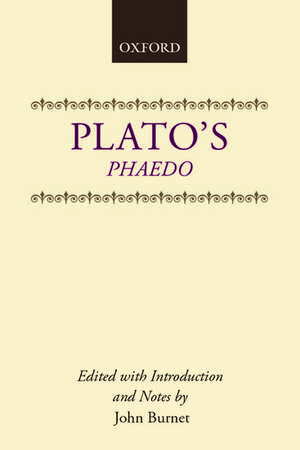Phaedo: Clarendon Paperbacks
Autor Plato Editat de John Burneten Limba Engleză Paperback – 26 apr 1979
| Toate formatele și edițiile | Preț | Express |
|---|---|---|
| Paperback (24) | 41.36 lei 22-36 zile | |
| CREATESPACE – | 41.36 lei 22-36 zile | |
| OUP OXFORD – 26 feb 2009 | 41.38 lei 10-16 zile | +13.37 lei 6-12 zile |
| CREATESPACE – | 45.18 lei 22-36 zile | |
| CreateSpace Independent Publishing Platform – | 46.82 lei 22-36 zile | |
| – | 50.19 lei 22-36 zile | |
| CREATESPACE – | 54.55 lei 22-36 zile | |
| CREATESPACE – | 59.75 lei 22-36 zile | |
| CREATESPACE – | 66.64 lei 22-36 zile | |
| Hackett Publishing Company – iun 1977 | 71.36 lei 22-36 zile | |
| CreateSpace Independent Publishing Platform – | 74.52 lei 22-36 zile | |
| CREATESPACE – | 84.01 lei 22-36 zile | |
| Focus Publishing – 31 aug 1998 | 85.80 lei 22-36 zile | |
| – | 43.47 lei 43-57 zile | |
| Digireads.com – 25 aug 2019 | 52.52 lei 43-57 zile | |
| ARC MANOR – 25 aug 2008 | 62.76 lei 43-57 zile | |
| Echo Library – 30 sep 2006 | 69.94 lei 38-44 zile | |
| Binker North – 15 iul 2023 | 83.42 lei 43-57 zile | |
| Blurb – 23 aug 2022 | 83.97 lei 43-57 zile | |
| 1st World Publishing – 30 sep 2008 | 96.73 lei 43-57 zile | |
| Akasha Classics – 11 noi 2009 | 98.72 lei 43-57 zile | |
| CreateSpace Independent Publishing Platform – | 110.90 lei 43-57 zile | |
| TREDITION CLASSICS – 31 oct 2011 | 131.28 lei 43-57 zile | |
| Clarendon Press – 26 apr 1979 | 257.84 lei 31-37 zile | |
| Clarendon Press – 30 oct 1975 | 355.35 lei 31-37 zile | |
| Hardback (3) | 149.80 lei 43-57 zile | |
| 1st World Publishing – 30 sep 2008 | 149.80 lei 43-57 zile | |
| Binker North – 2 mar 2020 | 184.61 lei 38-44 zile | |
| Akasha Classics – 11 noi 2009 | 195.26 lei 43-57 zile |
Din seria Clarendon Paperbacks
-
 Preț: 319.41 lei
Preț: 319.41 lei - 12%
 Preț: 312.89 lei
Preț: 312.89 lei - 19%
 Preț: 234.66 lei
Preț: 234.66 lei - 23%
 Preț: 187.53 lei
Preț: 187.53 lei - 28%
 Preț: 466.73 lei
Preț: 466.73 lei - 30%
 Preț: 565.06 lei
Preț: 565.06 lei - 18%
 Preț: 304.19 lei
Preț: 304.19 lei - 18%
 Preț: 307.58 lei
Preț: 307.58 lei - 13%
 Preț: 228.25 lei
Preț: 228.25 lei - 23%
 Preț: 330.93 lei
Preț: 330.93 lei - 18%
 Preț: 326.30 lei
Preț: 326.30 lei - 12%
 Preț: 315.20 lei
Preț: 315.20 lei - 11%
 Preț: 235.50 lei
Preț: 235.50 lei - 18%
 Preț: 251.40 lei
Preț: 251.40 lei - 22%
 Preț: 466.14 lei
Preț: 466.14 lei - 17%
 Preț: 353.79 lei
Preț: 353.79 lei - 34%
 Preț: 596.94 lei
Preț: 596.94 lei - 18%
 Preț: 311.21 lei
Preț: 311.21 lei - 27%
 Preț: 377.35 lei
Preț: 377.35 lei - 19%
 Preț: 306.73 lei
Preț: 306.73 lei - 22%
 Preț: 389.39 lei
Preț: 389.39 lei - 6%
 Preț: 277.78 lei
Preț: 277.78 lei - 34%
 Preț: 525.17 lei
Preț: 525.17 lei - 22%
 Preț: 322.10 lei
Preț: 322.10 lei - 27%
 Preț: 352.62 lei
Preț: 352.62 lei - 18%
 Preț: 325.17 lei
Preț: 325.17 lei - 22%
 Preț: 462.03 lei
Preț: 462.03 lei - 28%
 Preț: 446.89 lei
Preț: 446.89 lei - 27%
 Preț: 370.19 lei
Preț: 370.19 lei - 12%
 Preț: 355.20 lei
Preț: 355.20 lei - 19%
 Preț: 257.41 lei
Preț: 257.41 lei - 17%
 Preț: 314.16 lei
Preț: 314.16 lei - 27%
 Preț: 358.09 lei
Preț: 358.09 lei - 28%
 Preț: 337.32 lei
Preț: 337.32 lei - 23%
 Preț: 432.87 lei
Preț: 432.87 lei - 16%
 Preț: 344.74 lei
Preț: 344.74 lei - 12%
 Preț: 346.94 lei
Preț: 346.94 lei - 23%
 Preț: 400.39 lei
Preț: 400.39 lei - 19%
 Preț: 296.53 lei
Preț: 296.53 lei - 28%
 Preț: 319.42 lei
Preț: 319.42 lei - 28%
 Preț: 324.91 lei
Preț: 324.91 lei - 28%
 Preț: 368.67 lei
Preț: 368.67 lei - 27%
 Preț: 386.19 lei
Preț: 386.19 lei - 27%
 Preț: 381.14 lei
Preț: 381.14 lei - 15%
 Preț: 492.52 lei
Preț: 492.52 lei - 17%
 Preț: 285.23 lei
Preț: 285.23 lei - 27%
 Preț: 390.92 lei
Preț: 390.92 lei - 27%
 Preț: 390.01 lei
Preț: 390.01 lei - 34%
 Preț: 616.64 lei
Preț: 616.64 lei - 28%
 Preț: 386.02 lei
Preț: 386.02 lei
Preț: 257.84 lei
Preț vechi: 339.54 lei
-24% Nou
Puncte Express: 387
Preț estimativ în valută:
49.35€ • 53.63$ • 41.48£
49.35€ • 53.63$ • 41.48£
Carte tipărită la comandă
Livrare economică 09-15 aprilie
Preluare comenzi: 021 569.72.76
Specificații
ISBN-13: 9780198140146
ISBN-10: 0198140142
Pagini: 314
Dimensiuni: 124 x 187 x 17 mm
Greutate: 0.31 kg
Editura: Clarendon Press
Colecția Clarendon Press
Seria Clarendon Paperbacks
Locul publicării:Oxford, United Kingdom
ISBN-10: 0198140142
Pagini: 314
Dimensiuni: 124 x 187 x 17 mm
Greutate: 0.31 kg
Editura: Clarendon Press
Colecția Clarendon Press
Seria Clarendon Paperbacks
Locul publicării:Oxford, United Kingdom
Recenzii
This marvelously conceived new translation of Plato's most important dialogue will set the standard for classroom use for many years to come The authors' imaginative new interpretation will inspire students and generate scholarly controversy - and is thus certain to accomplish what it suggests is the true aim of Socratic inquiry: the weaving, unweaving, and perpetual re-weaving of the Logos. Dr. George R. Lucas, Jr., Professor of Philosophy, US Naval Academy, Annapolis
Notă biografică
Plato (428/427 or 424/423 - 348/347 BC) was an Athenian philosopher during the Classical period in Ancient Greece, founder of the Platonist school of thought, and the Academy, the first institution of higher learning in the Western world.
He is widely considered the pivotal figure in the history of Ancient Greek and Western philosophy, along with his teacher, Socrates, and his most famous student, Aristotle.[a] Plato has also often been cited as one of the founders of Western religion and spirituality.[4] The so-called Neoplatonism of philosophers like Plotinus and Porphyry influenced Saint Augustine and thus Christianity. Alfred North Whitehead once noted: "the safest general characterization of the European philosophical tradition is that it consists of a series of footnotes to Plato."[5]
Plato was the innovator of the written dialogue and dialectic forms in philosophy. Plato is also considered the founder of Western political philosophy. His most famous contribution is the theory of Forms known by pure reason, in which Plato presents a solution to the problem of universals known as Platonism (also ambiguously called either Platonic realism or Platonic idealism). He is also the namesake of Platonic love and the Platonic solids.
His own most decisive philosophical influences are usually thought to have been along with Socrates, the pre-Socratics Pythagoras, Heraclitus and Parmenides, although few of his predecessors' works remain extant and much of what we know about these figures today derives from Plato himself.[b] Unlike the work of nearly all of his contemporaries, Plato's entire body of work is believed to have survived intact for over 2,400 years.[7] Although their popularity has fluctuated over the years, the works of Plato have never been without readers since the time they were written





























